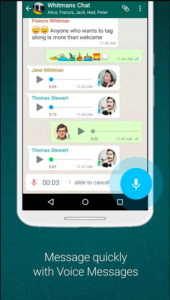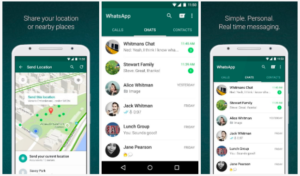WhatsApp is a text and voice messaging app that launched in 2009. It’s become incredibly popular since then, in no small thanks to its features and flexibility. As a free service, WhatsApp allows for messages and calls on both desktop and mobile devices.
Part of what makes this app appealing is that it works on various phone and computer operating systems, helping with messaging. It can also take advantage of Wi-Fi and cellular data to make one-on-one or group calls.
WhatsApp uses your phone’s cellular or Wi-Fi connection to facilitate messaging and voice calling to nearly anyone on the planet, alone or in a group, and is especially nice for families and small collaborative workgroups. The app lets you make calls, and send and receive messages, documents, photos, and videos.
WhatsApp is completely free — with no fees or subscriptions — because it uses your phone’s 4G, 3G, 2G, EDGE, or Wi-Fi connection instead of your cell plan’s voice minutes or text plan. If you’re connected via Wi-Fi, it won’t eat into your data plan either. Its popularity is sustained by its support for worldwide free calling, even if the people chatting are not in the same country.
WhatsApp is platform agnostic. You do not need to own the same brand of phone as your call recipient or be on a specific platform — the app works with iPhone, Android, and Windows phones, and Mac or Windows desktop or laptop computers, which you can use to send and receive messages, but not make calls. Like any other SMS messenger, you can initiate a conversation with an individual or a group and video chat with up to four people.
The iOS version also has in-app support for video playback from both Instagram and Facebook. You can also share your location, broadcast your status to your contacts, share contacts, set customized wallpapers and notification alerts, email chat history, use the camera to shoot photos and videos from within the app, and simultaneously broadcast messages to multiple contacts.
You are always logged in so you never miss messages, but even if you miss notifications while your phone is off, the app saves recent messages for when you re-open the app.

Mission
From day one, they have built WhatsApp to help you stay in touch with friends, share vital information during natural disasters, reconnect with separated families, or seek a better life.
Some of your most personal moments are shared with WhatsApp, which is why we built end-to-end encryption into our app. When end-to-end encrypted, your messages, photos, videos, voice messages, documents, and calls are secured from falling into the wrong hands.
Security by Default
WhatsApp’s end-to-end encryption is available when you and the people you message use our app. Many messaging apps only encrypt messages between you and them, but WhatsApp’s end-to-end encryption ensures only you and the person you’re communicating with can read what is sent, and nobody in between, not even WhatsApp.
This is because your messages are secured with a lock, and only the recipient and you have the special key needed to unlock and read them. For added protection, every message you send has its own unique lock and key. All of this happens automatically: no need to turn on settings or set up special secret chats to secure your messages.
Payments on WhatsApp, which are available in select countries, enable transfers between accounts at financial institutions. Card and bank numbers are stored encrypted and in a highly-secured network. However, because financial institutions can’t process transactions without receiving information related to these payments, these payments aren’t end-to-end encrypted.
Speak Freely
WhatsApp Calling lets you talk to your friends and family, even if they’re in another country. Just like your messages, WhatsApp calls are end-to-end encrypted so WhatsApp and third parties can’t listen to them.
Messages that Stay with You
Your messages should be in your hands. That’s why WhatsApp doesn’t store your messages on our servers once we deliver them, and end-to-end encryption means that WhatsApp and third parties can’t read them anyway.
See for Yourself
WhatsApp lets you check whether the calls you make and messages you send are end-to-end encrypted. Simply look for the indicator in contact info or group info. (Above Source- Whatsapp)

Whatsapp Does Earn Revenue Through Ads. Actually, The Founders Hated Advertisements and created this ad-free platform focusing just on great use interface.
Initial Revenue Generation Strategy- Firstly, they decided to come up with a paid version of this application where they charged annual fee of 1$ from the users. (In Some Countries)
Then, Whatsapp For Finding of 250K by Five ex-Yahoo! friends. Another Funding was carried out by Sequoia Capital which invested the total amount of 60$ Million In Whatsapp Inc.
The Amazing Part- This Was The Only Source Of Income For The 50 staff members of Whatsapp. This Went Whatsapp Waved OFF The 1$ Subscription Fees And Now You Don’t Have To Pay Anything For Whatsapp.
Whatsapp Revenue Model- Facebook Strategy. After the acquisition Facebook introduced some really strategic plans for Whatsapp revenue model;
- Whatsapp Business
- Whatsapp For Business API
How Are They EARNING MONEY?
Answer- API
Actually Whatsapp Do Not make Money With Whatsapp Business!
Future Earning Strategies- It Looks Like Copying Snapchat’s features was’t just to steal consumer base, Whatsapp is now planning to copy it’s revenue earning strategy as well.
Also Read – New Jio Mart! WhatsApp + Jio 2020!
Subscribe Me: Aayush YEET
Subscribe: TechParadise
